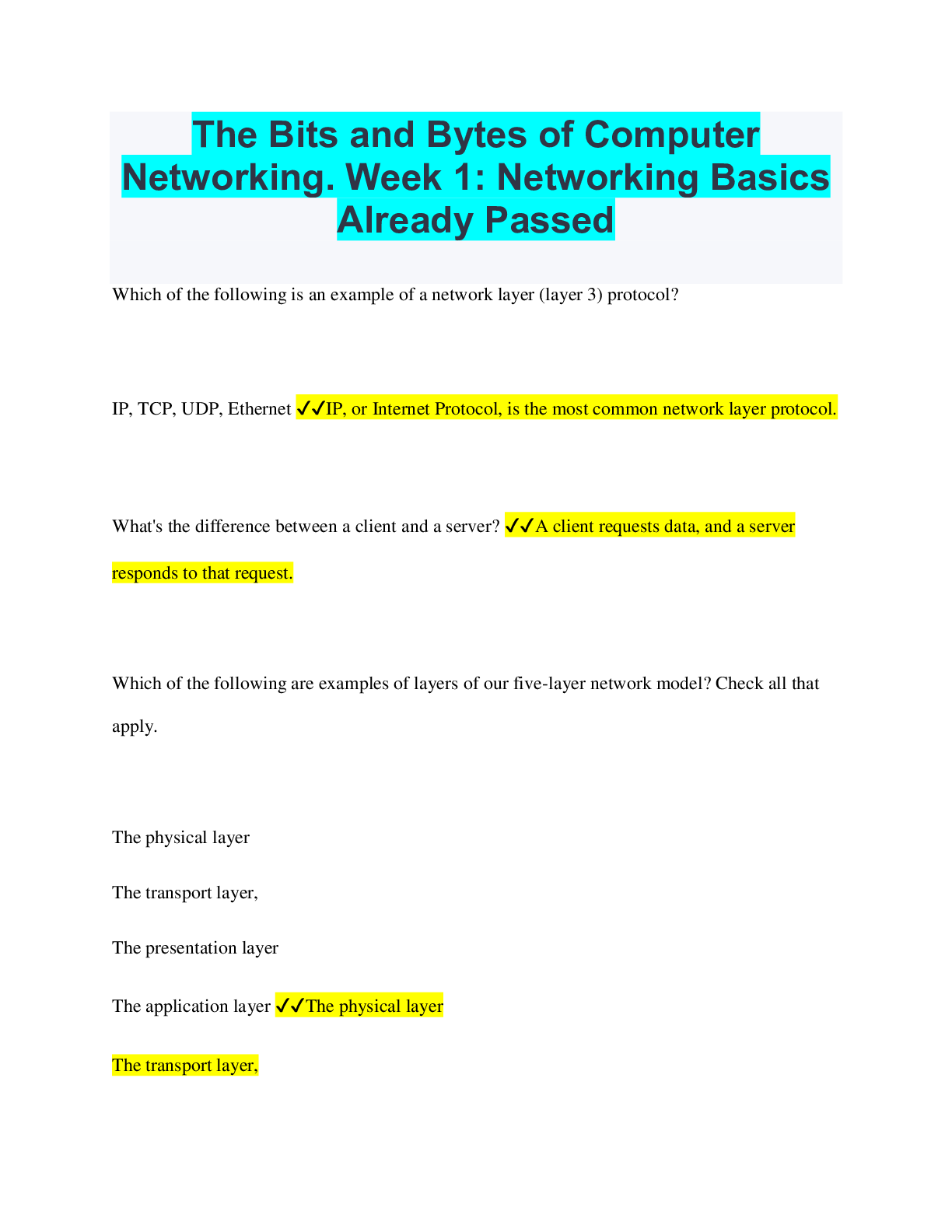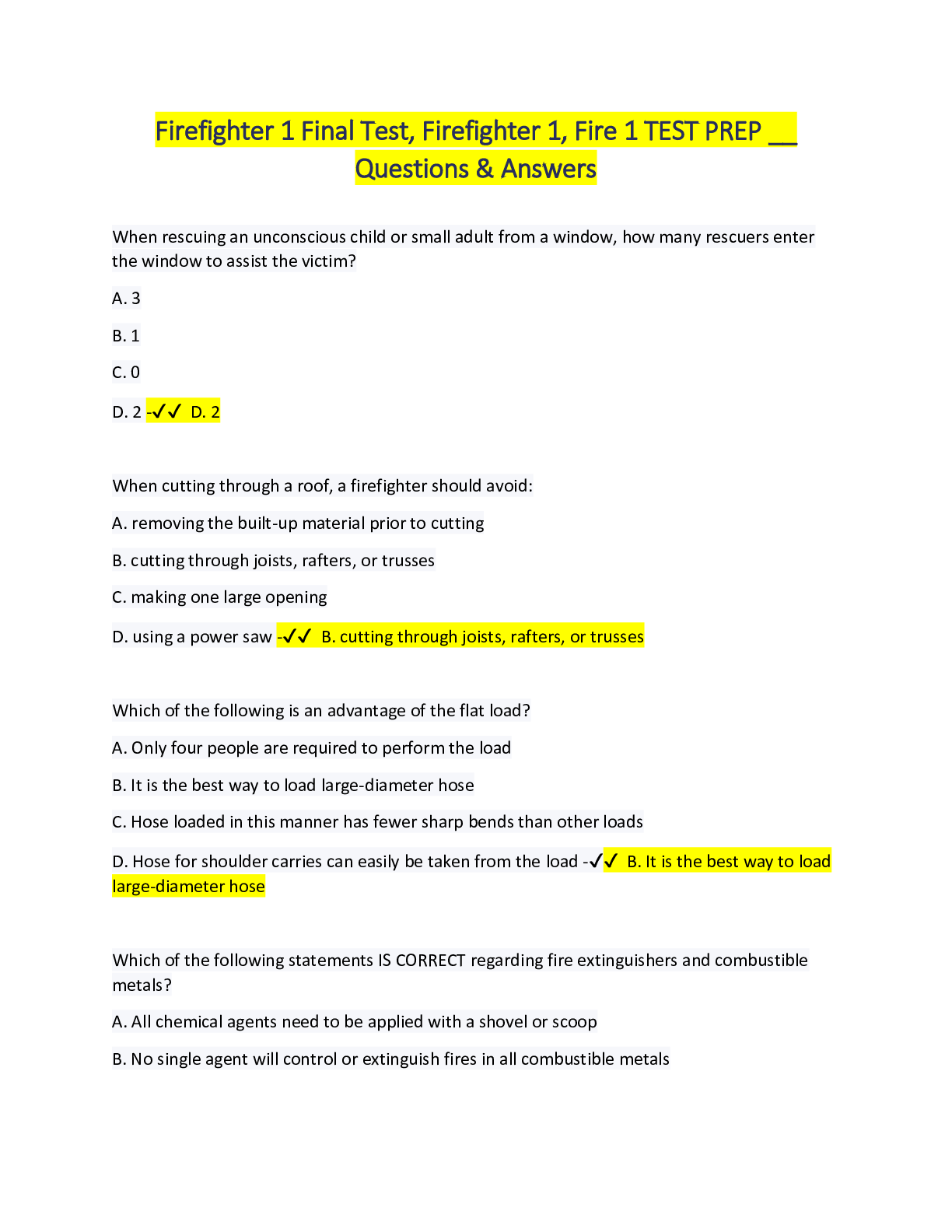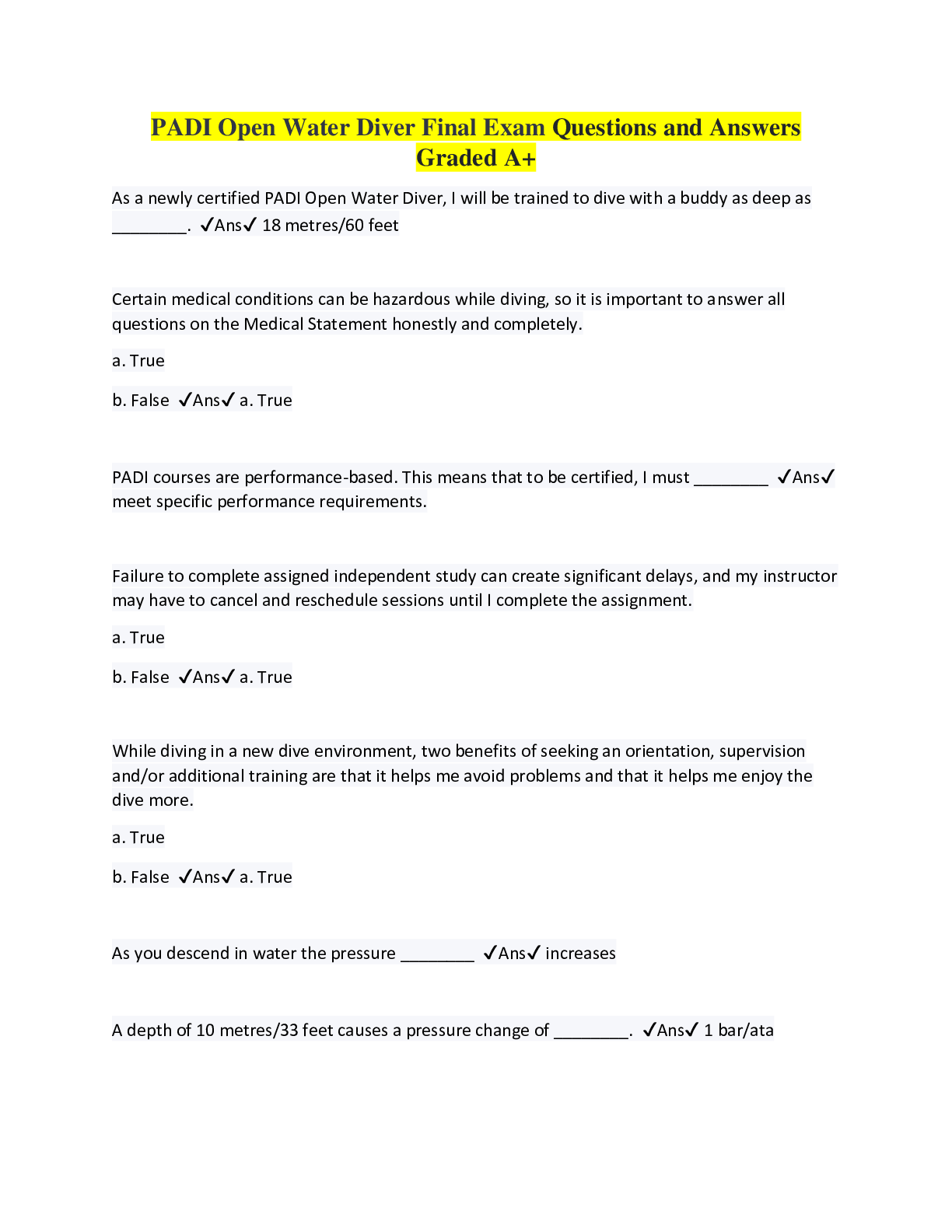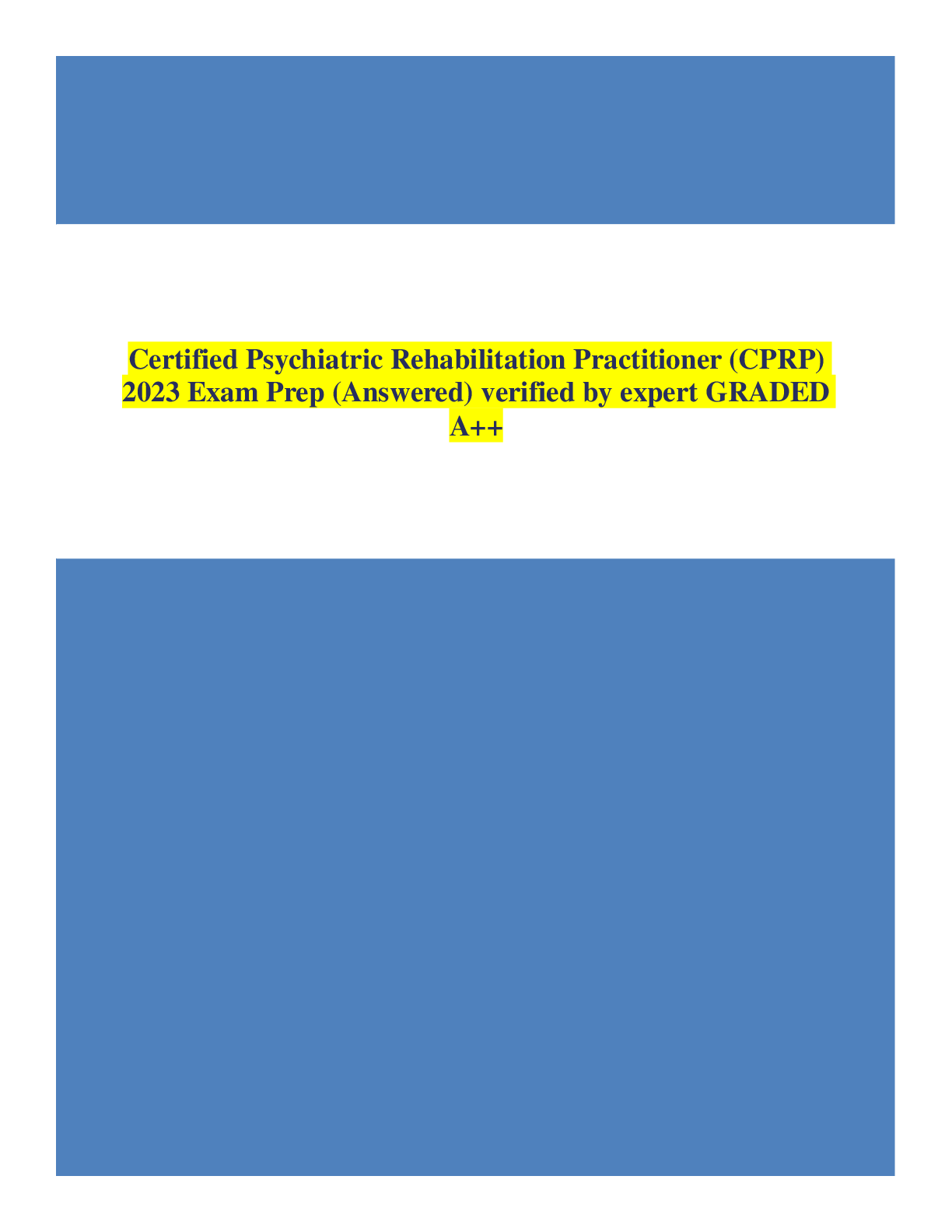Medicine > QUESTIONS & ANSWERS > CPRP; Certified Psychiatric Rehabilitation Practitioner (CPRP) Exam 2022 Graded A+ (All)
CPRP; Certified Psychiatric Rehabilitation Practitioner (CPRP) Exam 2022 Graded A+
Document Content and Description Below
CPRP; Certified Psychiatric Rehabilitation Practitioner (CPRP) Exam 2023 Graded A+ Psychiatric Rehabilitation -✔✔ .... promotes recovery, full community integration and improved quality of lif... e for persons who have been diagnosed with any mental health condition that seriously impairs their ability to lead meaningful lives. Psychiatric rehabilitation services are collaborative, person-directed and individualized. These services are an essential element of the health care and human services spectrum, and should be evidenced-based. WRAP -✔✔ Wellness Recovery Action Plan Assertive Community Treatment (ACT) -✔✔ -an evidence-based practice that improves outcomes for people with severe mental illness who are most vulnerable to homelessness and hospitalization. Principles of Psych Rehab Groupings -✔✔ 1-3= Roles of the Practitioners 4-10= Best Practices in the Field 11-12 PsyR Service Delivery Evidence-Based Practice (EBP) -✔✔ - recognizes the importance of understanding and following research recommendations, while taking into account the service provider's clinical expertise and the goals, preferences, interests, values, and characteristics of the people using the service Empirically Supported Treatment (EST) -✔✔ -a type of intervention that has been proven effective, such as cognitive behavioral therapy for treatment of depression. Evidenced-Based Medicine (EBM) -✔✔ -the process an individual practitioner follows in selecting the appropriate intervention for one individual diagnosed with a particular condition who is experiencing specific symptoms. Recovery -✔✔ ......a deeply personal unique process of changing one's attitudes, values, feelings, goals, skills, and/or roles. it is a way of living a satisfying, hopeful, and contributing life even with limitations cause by illness. Recovery involves the development of new meaning and purpose in one's life as one grows beyond the catastrophic effects of mental illness. Recovery Relating to principles of PsyR -✔✔ Recovery from mental illness involves much more than recovery from the illness. itself. People with mental illness(es) may have to recover from the stigma that they incorporated into their very being; from the iatrogenic effects of treatment setting; from the lack of recent opportunities for self-determination; from the negative side effects of unemployment; and from crushed dreams. Recover is a complex, time-consuming process. The Eight Essential Features of recover-oriented mental health services -✔✔ 1. Recovery can occur without professional intervention. 2. A common denominator of recovery is the presence of individuals who believe in the person in recovery and will stand by him/her. 3. Recovery as a vision does function as a part of a person's ideas or theories about "mental illnesses". 4. Recovery occurs despite that mental health symptoms may reoccur. 5. Recovery changes frequency and duration of mental health symptoms. 6. Recovery is not necessarily a linear process. 7. The consequences of the "illness" (eg. stigma) often can be harder to overcome than any of its symptoms. 8. Recovery does not suggest that a person never had a mental illness of never experienced mental health symptoms. Noordsy et al. definition of recovery is centered around what 3 core concepts: -✔✔ 1. hope 2. taking personal responsibility 3. getting on with life. Principles of Psychiatric Rehabilitation -✔✔ 1. Psychiatric rehabilitation practitioners (PRP) convey hope and respect and believe that all individuals have the capacity for learning and growth. 2. PRP recognize that culture is central to recovery and strive to ensure that all services are culturally relevant to individuals receiving services. 3. PRP engage in the processes of informed and shared-decision making and facilitate partnerships with other people the individual receiving services has identified 4. PsyR practices build on strengths and capabilities of individuals. 5. PsyR practices are person-centered; they are designed to address the unique needs of individuals, consistent with their values, hopes, and aspirations. 6. PsyR practices support full integration of people in recovery into their communities where they exercise their rights of citizenship as well as to accept the responsibilities and explore the opportunities that come with being a member of a community and a larger society. 7. PsyR practices promote self-determination and empowerment. All individuals have the right to make their own decisions, including decisions about the types of services and support they receive. 8. PsyR practices facilitate the development of personal support networks by utilizing natual supports within communities, peer support initiatives, and self-and mutual-help groups. 9. PsyR practices strive to help individuals improve the quality of all aspects of their lives, including social, occupational, educational, residential, intellectual, spiritual, and financial. 10. PsyR practices promote health and wellness, encouraging individuals to develop and use individualized wellness plans. 11. PsyR Services emphasize evidence-based, promising, and emerging best practices that produce outcomes congruent with personal recovery. Programs include structured program evaluation and quality improvement mechanisms that actively involve persons receiving services. 12. PsyR services must be readily accessible to all individuals whenever they need them. These services also should be well coordinated and integrated with other psychiatric, medical, and holistic treatments and practices. SAMHSA's definition of recovery: -✔✔ A process of change through which individuals improve their health and wellness, live a self-directed life, and strive to reach their full potential. SAMHSA's Four Major Dimensions of Recovery -✔✔ 1. HEALTH: Overcoming or managing one's disease(s) as well as living in a physically and emotionally healthy way; 2. HOME: A stable and safe place to live; 3. PURPOSE: Meaningful daily activities, such as a job, school, volunteerism, family caretaking, or creative endeavors, and the independence, income, and resources to participate in society; 4. COMMUNITY: Relationships and social networks that provide support, friendship, love, and hope. The Medical Perspective on Psychiatric Disability -✔✔ -Focused on treating the mental health condition (the symptoms of the psychiatric illness). -Use language such as mental impairment, psychiatric disorder, emotional disturbance, or diagnosis. -Follows the DSM- to be a disorder: -symptoms must be noticeable (clinically significant) -must be/or at risk of causing difficulty in role functioning -must have abnormal/not "culturally-sanctioned" reactions/behaviors to events -a faulty way of perceiving or reacting to the world [Show More]
Last updated: 2 years ago
Preview 1 out of 10 pages
 Exam 2022 Graded A+.png)
Buy this document to get the full access instantly
Instant Download Access after purchase
Buy NowInstant download
We Accept:

Reviews( 0 )
$9.00
Can't find what you want? Try our AI powered Search
Document information
Connected school, study & course
About the document
Uploaded On
Jan 30, 2023
Number of pages
10
Written in
Additional information
This document has been written for:
Uploaded
Jan 30, 2023
Downloads
0
Views
105



 Answered 2023.png)









.png)



